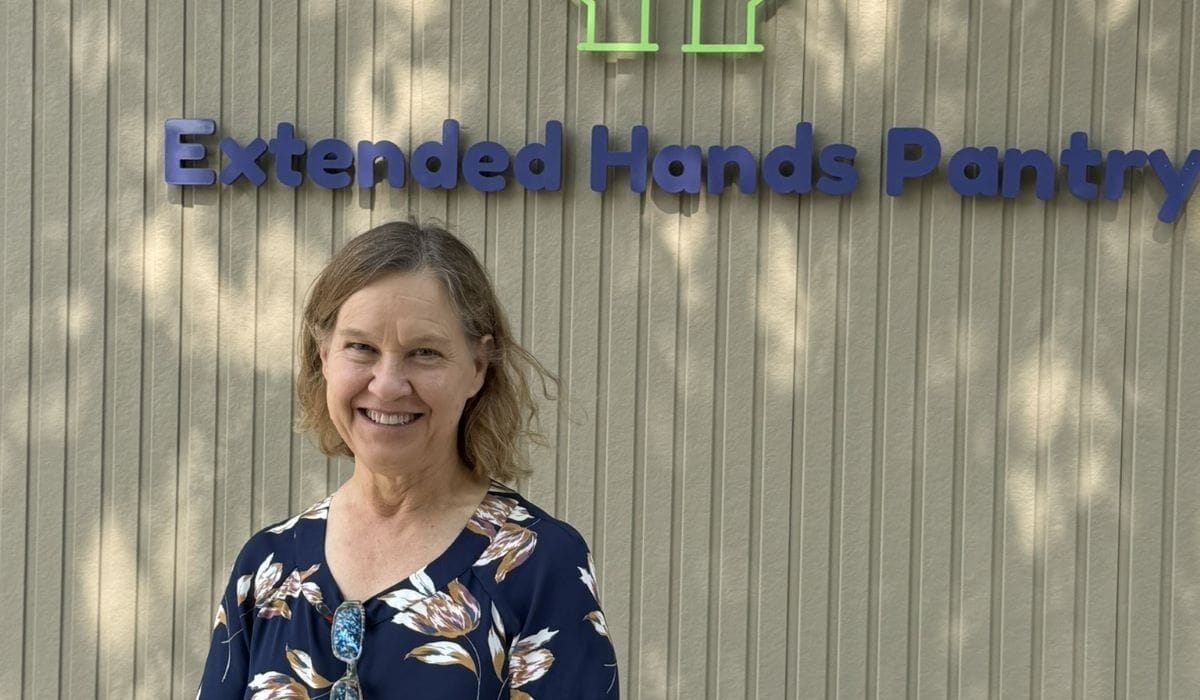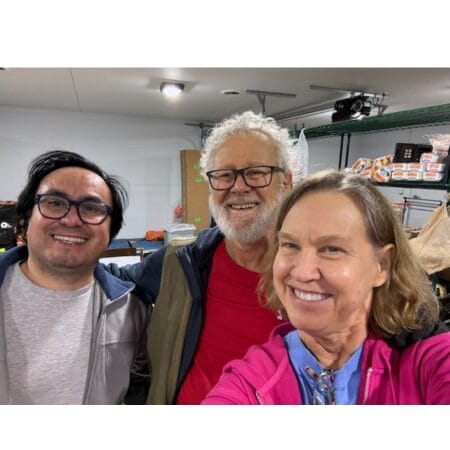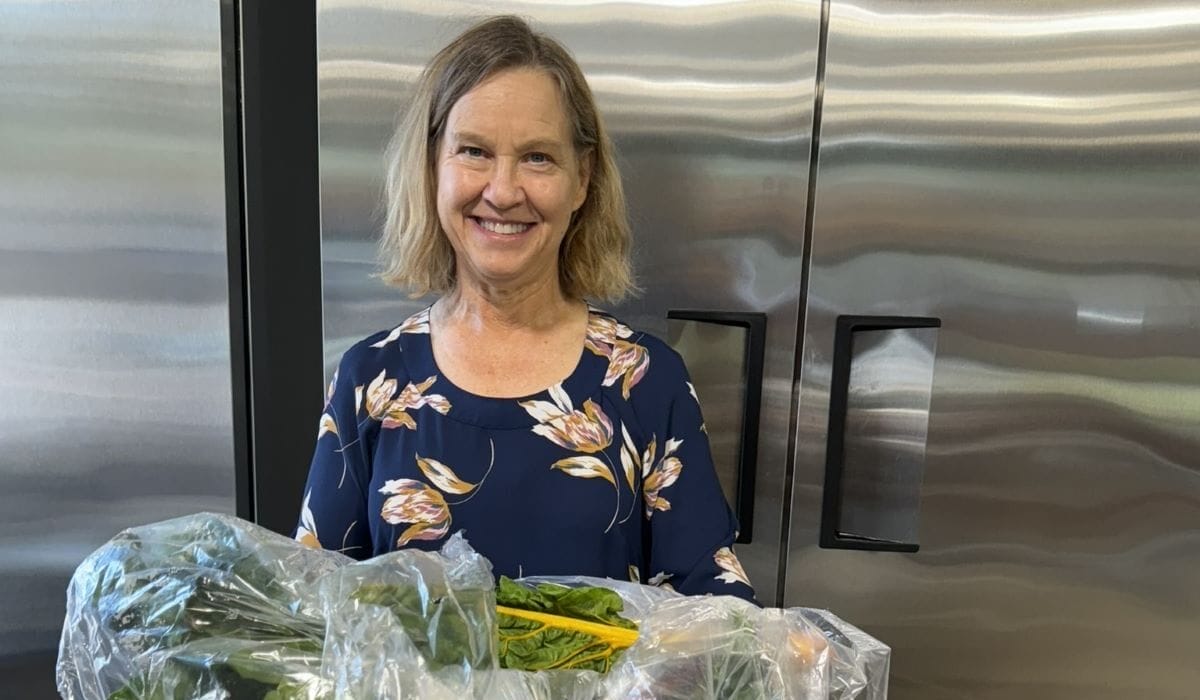Restoring Dignity, Supporting Families and Fighting Hunger in Madison

Meet Daily Point of Light Award honoree Jenny Czerkas. Read her story, and nominate an outstanding volunteer or family as a Daily Point of Light.
Jenny Czerkas has dedicated her life to uplifting some of Madison’s most vulnerable communities. As the co-founder and operations director of Extended Hands Pantry, Jenny helped fill bellies and increase hope for countless low-income households, particularly for immigrants and refugees, who rely on the pantry for critical support.
Jenny started a 100% mobile food pantry during the pandemic to address the increasing food shortages faced by families. What began as an emergency response soon blossomed into an essential service. The success and overwhelming need for the mobile pantry led Jenny to expand the program into a permanent, indoor market. This innovative, faith-based pantry allows families to self-select their groceries for the week, ensuring they have access to foods that suit their cultural and dietary needs—all at no cost. Today, this program provides food to over 2,100 people every month.
Cultural inclusivity is at the heart of Jenny’s work. She makes sure that all signage and labels in the food pantry are available in both Spanish and English, recognizing the needs of the various populations the pantry serves. By making the food pantry accessible and culturally relevant, Jenny has helped create a safe and welcoming space for families who might otherwise struggle to access nutritious foods that align with their heritage.
In addition to the food pantry, Jenny has also been instrumental in launching an annual backpack program that provides new school supplies to children from low-income families. Serving over 300 children each year, this program ensures that every student is equipped with the tools they need to succeed academically, reducing the financial strain on parents who may not be able to afford back-to-school expenses.
Beyond this, Jenny coordinates food deliveries for an afterschool program, serving 60-80 children each week. Since the implementation of these food deliveries, the number of children attending the community center for help with reading and math has increased by 65%. Volunteering more than 40 hours a week, Jenny’s dedication is remarkable. She has not only built a lifeline for her community but also created a model of what it means to truly serve from the heart.
Read on to learn more about Jenny’s journey and why food security in Madison is so vital to her.

Tell us about your volunteer role.
My husband and I have been involved in serving low-income communities for over 25 years. During that time, a couple of things became more and more important to us. And one is understanding the importance of nonprofits partnering together. This is a big deal because nonprofits can sometimes feel like they’re competing for the same scare dollars. There’s some truth to that, but we actually came to realize the importance of those partnerships.
At the same time, working with low income communities, we starting seeing the importance of kids being fed. There are hundreds of kids who go to bed without dinner at night and go to school without having had breakfast in the morning. A child’s ability to learn, while food insecurity is an issue for them every day, is greatly reduced. So our desire was to come together to assist in an educational environment along with providing nutritional foods.
We serve primarily immigrants and refugees. Yesterday, we served about 230 families at the pantry. Out of that, we had less than 10 white families. I’ve learned how to say hello in about 10 languages. The food pantry is located in a bilingual community, in a low-income school that has a 90% free and reduced lunch rate. This is an ideal place for a food pantry.
Food is a big deal for me, coming from a dairy farm. And we are committed to doing our best to provide people the foods they’re accustomed to eating every single day. We have halal meat for the Muslim families that come through. I have three kinds of flour. I have five kinds of dried beans. A guy from Chile just recently told me that there’s another kind of bean he’d like me to bring in from where he’s from, one that he’s used to making and eating. You might not think this is a big deal, but it is. These people are in a new country with a new language. Everything is new, everything is strange, everything is unusual. For them to be able to get the kinds of foods they’re accustomed to eating every single day, we strive to provide that.
We’re what’s called a walk-in food pantry. Anyone can come in during the open hours, and it’s self-declared need pantry. We have enough space for right now, including refrigerator and freezer space, and it’s been a long time since we ran out of food. But a couple of years ago, we were all mobile and we would run out of food from time to time. Then, we were able to build an addition in the school where we operate, and since then, we haven’t run out.
What inspired you to get started with this initiative?
It was through the relationships we were building in these communities. Through those relationships, we discovered that food was really a big deal. I listened to mom after mom after mom talk to me about their struggles with providing adequate nutrition for their kids. How they would water down their milk, for example. You’re talking to a farm kid! As a farm family, when I was a kid, we were cash poor, but we ate really well. We grew our own food, we ate our own meat. So when I heard that these moms just did not have enough money to feed their kids, every day of the week, and to me this seemed like a solvable problem.
I didn’t have any experience in this but I visited about eight to ten food pantries in the area, I got a lot of information about how they were run and how they sourced their food, and my husband and I sat down and said, “This is something we can do.” So we started a faith-based food pantry. We didn’t have a manual… we wrote our own how-to manual along the way!
Second Harvest is where the bulk – over 70% – of our food is coming from. Of that, some is purchased, some is free. We also get food from TEFAP, the governmental emergency food assistance program, which makes up about 10% of the food we distribute. Then the rest is purchased wholesale.
Why is this issue so important to you?
It’s more than just handing out some milk and eggs and frozen chicken. It’s also about the way they’re treated on site. I learn their names, the names of their kids. We try to give all the small children a small toy. It makes a big difference, that people feel safe and welcome, and most importantly, that they don’t feel ashamed. I like to say to the women when they walk in, “Hello beautiful, how are you doing today?” You know, if you’re struggling, those words can make a difference. We work so hard at restoring dignity to people at the pantry.

What are your long-term plans or goals for the organization?
I’m a full-time volunteer, and my background was in IT. So I have statistics that would bore most people to death. But it helps us predict what we can anticipate as a nonprofit. The food pantry is growing – and I think this is happening nationwide – but we actually have 154% growth from a year ago. I looked at July and August last year, as compared to this year, and that was the growth rate. I had to do that math about four times, because I had a hard time wrapping my head around that.
So right now, our goal is just to keep up with the demand. It would be great if we could open another day, but right now we’re open three days a week serving about 550 families a week. But in a month, even that number will be outdated. It’s just a moving target that we keep trying to keep up with.
What’s been the most rewarding part of your work?
Seeing how happy women are when they go out with their carts of food. Or a guy who came in recently and was so anxious. When he got through the whole process, he walked out with the biggest smile on his face. The next week, he came back with his wife. He’s able to source some of the food that he enjoys eating, that he can share with his family. Those are the most rewarding parts.
Why is it important for others to get involved with causes they care about?
I think it’s very important for people to get involved with their communities, for a variety of reasons. It helps your attitude and your mindset. You become more grateful for what you have. Your petty problems don’t seem so important anymore. When you see a woman walk in with an 8-day-old baby, two toddlers and a stroller, and she can only take enough food for her family as she can fit into the stroller.
Here, there’s a beltline that’s awful to drive. Traffic is terrible. But if you think driving on the beltline is a problem, serve people in a food pantry for a couple of hours and you won’t think traffic on the beltline is a problem at all. Volunteering helps get life in perspective and sort through what’s important and what’s not.
Any advice for people who want to start volunteering?
There are volunteer opportunities for anybody, something that’s going to just fit. Get out there and try something. If it doesn’t fit, get out there and try something else, until you find the right fit. We could take a whole slew of volunteers with different strengths and skills that we could be able to put to use in some form or another. There’s always an opportunity for a specific skill set.
Do you want to make a difference in your community like Jenny? Find local volunteer opportunities.
